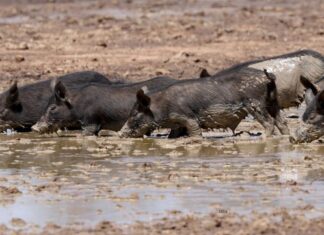Concerns over mining operations have heightened, with many worried about the impact of new draft legislation on rural communities in Queensland.
On Monday, Premier Anna Bligh announced a prohibition on exploration leases and mining within a two-kilometre radius of towns with populations of more than 1000 people. The restriction will cover existing exploration permits as well as future permits in these areas.
“It means there will be no more exploration activity on urban land or within a two kilometre buffer of urban land,” Ms Bligh said.
Ms Bligh said the Government would take feedback on the draft legislation to enshrine the changes which are expected to be in place later this year.
However, local politicians and industry groups have spoken out against the draft legislation, saying it unfairly discriminates rural communities.
Federal LNP Member for Maranoa Bruce Scott said every home should be protected from mining operations by a buffer zone.
“What is the difference between a town of 1000 people, a township of 50 people and a farm house located on a property outside of a township?
“Every farming family and township, regardless of their population, should be afforded an adequate protective buffer zone from mining operations.”
Mr Scott said that buffer zones were essential for the health and safety of residents who could be exposed to the noise and dust associated with mining activities.
“Labor’s announcement does not go far enough in providing equal protection for all families and communities in Maranoa’s resources-rich regions,” he said.
The CEO of Queensland’s peak broadacre farm group AgForce, Robert Walker, said the move sends a message that private landowners and remote communities will be treated differently.
“It seems it is OK to have an exclusion zone of two kilometres around a town, but a farmer can have a coal seam gas well 100 metres from his front door – we don’t believe that is fair,” Mr Walker said.
“The Government needs to deal with all parts of the economy and all parts of the community on a level playing field.”
Mr Walker said AgForce is concerned there was no consultation with stakeholders prior to the Premier’s announcement and it does little to inject much-needed equity into this debate.
“The State Government obviously has concerns about mining close to townships, but it shouldn’t matter whether there are five people living in a township or five people living in a homestead – these same exclusion zones should apply,” Mr Walker said.
AgForce is seeking urgent meetings with the State Government on this issue.
Employment Skills and Mining Minister Stirling Hinchliffe said Queensland had some of the toughest regulations in the world when it comes to mining exploration.
“We’ve got the rules and regulations in place and new measures announced this week will go a long way towards easing community concerns,” Mr Hinchliffe said.
Mr Hinchliffe said an exploration Restricted Area would take effect from August 16, 2011.
“We will enshrine these changes by amending the Mineral Resources Act 1989 to prevent existing exploration tenure holders from undertaking any exploration activities in and around all urban areas across Queensland.
“The interim Restricted Area will remain in place while legislative amendments are being prepared and we consult the community and industry about a long-term strategy to balance exploration and urban living.”
The Association of Mining and Exploration Companies has said the ban would affect 285 existing exploration permit holders and that the Government had indicated these permit holders would not receive any compensation for the loss of these assets.
“The State Government should consider a cooling off period to consult with various stakeholders and try to build some flexibility into the policy. There needs to be a consultation process between the Government, miners and landowners to resolve this issue appropriately and fairly,” said AMEC CEO, Simon Bennison.
“This decision with its retrospectivity will seriously impact on the asset base of a number of companies. Introducing a legislative change that will have such an adverse effect on the economy of Queensland without proper consultation with industry and permit holders is poor policy.”
Buffer zones set to protect urban areas
Digital Edition
Subscribe
Get an all ACCESS PASS to the News and your Digital Edition with an online subscription
Million-dollar feral pig plan opens for feedback
The Queensland Government’s $1 million feral pig management action plan draft is now open for public consultation.
Aligning with the national action plan, the...








